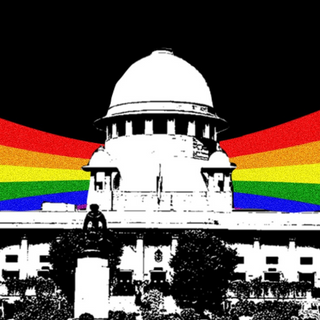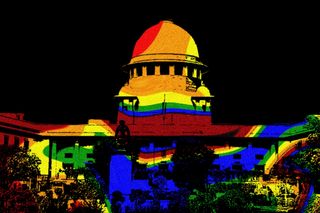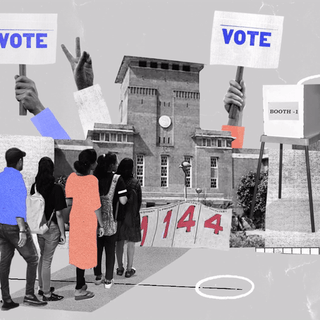
The Marriage Equality Hearings: Week 4
The Swaddle’s Hetvi Kamdar sat in on week 4’s hearings and asked petitioner Utkarsh Saxena a few questions about the salient points.

The ongoing Supreme Court hearings on marriage equality petitions mark the first significant case in the Indian judiciary that’s being live-streamed to the nation. With all eyes on the outcome of the case, on behalf of The Swaddle, Hetvi Kamdar sat in on week 4’s hearings and asked petitioner Utkarsh Saxena, who is also a lawyer on this case, a few questions about the salient points.
The marriage equality hearings ended this week, and the court has reserved its judgment. Spread across 10 days, this proceeding is a milestone in the fight for equality and recognition. The hearings witnessed the central government strongly opposing the plea — contending that it would have a bearing on a large number of issues including adoption, inheritance, and divorce covered by different statutes. It also questioned the maintainability of the petitions seeking legal recognition of same sex marriage.
On Wednesday, May 10, 2023, the Center told the Supreme Court that the states of Rajasthan, Assam and Andhra Pradesh have opposed legal recognition for same-sex marriages, while other states such as Maharashtra, Uttar Pradesh, Manipur and Sikkim are yet to pick a stance. According to India Today, Rajasthan, in its response to the Center’s letter had stated that same-sex marriages will create imbalance in the social fabric — leading to far-reaching consequences for the society and family system.
As we await the court’s verdict, it is important to understand what it is about queerness that threatens our traditional family structure so much.
The Swaddle: The hearings in court this week brought up a conversation around how children would react to someone having same-sex parents in opposition to the petition. Even across discussions, the topic of children is used to dissuade marriage equality as though queerness is contagious or threatening. What is your view on this?
Utkarsh Saxena: This was raised on the very first day of the hearing, and the Chief Justice himself had to clarify to the other side that he hopes they realize that just because a queer couple has children doesn’t mean that they will turn out to be queer. This is not something that one passes on. So, I don’t think the idea that queerness is somehow contagious was taken very seriously by the court.
There was some evidence placed on record by the other side that argued that a child’s emotional well-being or mental health is affected. But there was very little, very scant literature placed on record. On our side, Dr. Menaka Guruswamy actually made a very compelling case — placing almost 30 to 40 articles from across different disciplines of scholarship that clearly demonstrate that there is absolutely no negative impact of being raised in a queer family. So really, this argument has no merit. It’s been raised every time to create some kind of paranoia, but is very ill-founded and has no scientific basis. The other thing to note is that there are petitioners who already have children, who have already adopted children, and have been leading their lives, and that their kids have been like any other kids in any other families. What we are basically now asking is for a de jure recognition. So it’s not true — families already exist, and families that will come along will also be as messy, as happy, and as complicated like any other family.
TS: Another point that was raised in court is how “a child has the right to be born and raised by biological parents,” and that heterosexual couples are better as parents because fathers and mothers have complementary roles in a relationship. The child’s right body, NCPCR, further stated that while gender may be fluid, motherhood isn’t. How would you address arguments against queer parenting in regard to this?
Utkarsh Saxena: It’s unfortunate that these kinds of arguments are being made in court, to be very honest. This idea that only biological parents can be good parents… I mean, come on, we have a full adoption regime in the country, where kids are adopted by people other than their biological parents and brought up in a perfectly healthy, happy, and supportive environment.
By their logic, the adoption regime is also flawed, and we should have no adoption. Even the idea that you must have a father and a mother play complementary roles is so outdated. There are single mothers bringing up children, single fathers bringing up children, all of whom are very successful parents as many of us know anecdotally, but also as we know through extensive research on the social sciences. Similarly, there’s no reason why queer families will be any different. A lot of this skepticism comes from the fact that we haven’t seen queer families. Queer families haven’t been given a chance to exist and to be a part of society. And a lot of these fears, as has happened in other countries, will get allayed as you allow more and more queer families to exist and bring up children.
TS: The Supreme Court indicated that it may stop short of granting formal marriage rights to members of LGBTQ+ community, but appeared firm on issuing a constitutional declaration which the Parliament may choose to implement by enacting appropriate laws. Is this a decision the petitioners are happy with?
Utkarsh Saxena: There’s no decision here. The court is doing its job as an adjudicating authority to ask all kinds of questions and to explore all options before it. And this is just one of the options it explored. The petitioners have argued against it saying that a constitutional declaration not grounded in the law, and without substance and teeth, is not effective for us because you may say that we have the fundamental right to marry. But then, what do we do with that? How do we go to a family court and actually get married? How do we go to a marriage officer and actually get married? If we want to avail any of the benefits once we have that marriage recognition by opening a bank account or adding partners to our health insurance or any of the other rights that flow from marriage, how will we access them? So in our view, a constitutional declaration without some grounding in a statute that is at par with the kind of rights that other heterosexual couples get in society, will not be true marriage equality. And, therefore, we are pushing for the same kind of rights that heterosexual couples get under the Special Marriage Act.
TS: Is there any news about when the verdict will be announced?
Utkarsh Saxena: The court will deliberate on the arguments, and write a judgment over the course of the summer vacation. After it reopens on July 3, the announcement could come any time. It could be pronounced within the very first week, or it could take a little bit longer. Personally, I think we’re expecting it to be sometime around July or August.
TS: And are you optimistic about the outcome of this case?
Utkarsh Saxena: We are cautiously optimistic. We think we’ve come a long way because of the court. The court has played such a big role in busting myths and changing mindsets — through its NALSA judgment, where it identified transgender persons and the third gender, as well as through the decriminalization of homosexuality in 2018 — that we hope it will similarly continue to catalyze this process and also give us marriage rights. But even though we’re optimistic, we’ll accept whatever verdict the court pronounces. If it’s not in our favor, well, there are ups and downs in the battle for civil rights, but as long as we’re moving in the direction of progress, you keep persevering, right? So, if we lose, we will knock the doors of the court another time — perhaps, when we feel society is more ready to accept us.
Hetvi is an enthusiast of pop culture and all things literary. Her writing is at the convergence of gender, economics, technology and cultural criticism. You can find her at @hetviii.k.
Related


Spanish Court Orders Man to Pay Ex‑Wife 200,000 Euros for 25 Years of Unpaid Labor
